2023届高三英语二轮复习常见介词的用法课件(52张PPT)
文档属性
| 名称 | 2023届高三英语二轮复习常见介词的用法课件(52张PPT) | 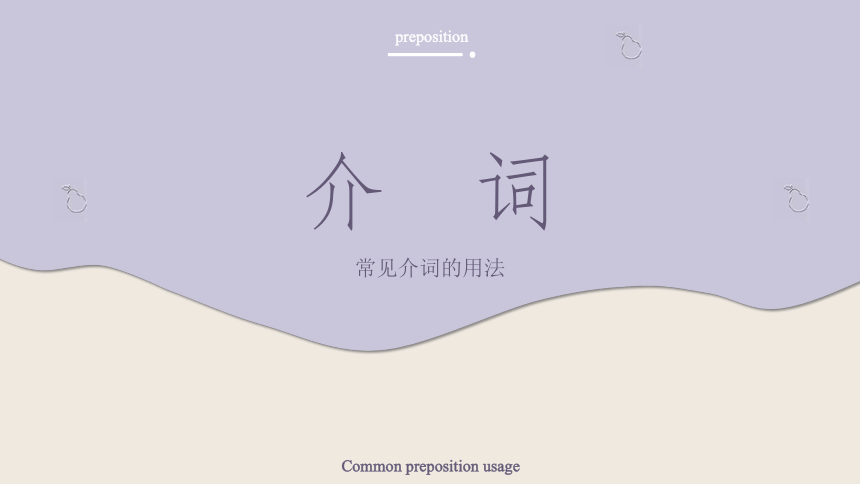 | |
| 格式 | pptx | ||
| 文件大小 | 194.0KB | ||
| 资源类型 | 教案 | ||
| 版本资源 | 通用版 | ||
| 科目 | 英语 | ||
| 更新时间 | 2023-01-09 17:16:23 | ||
图片预览

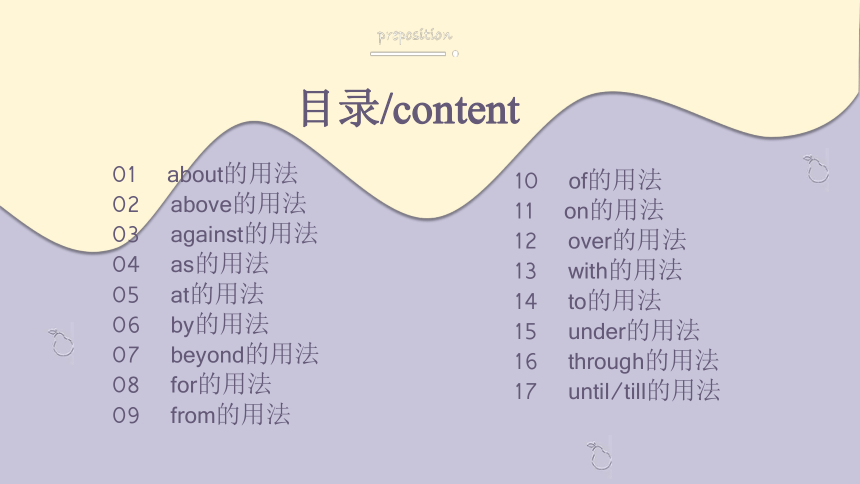
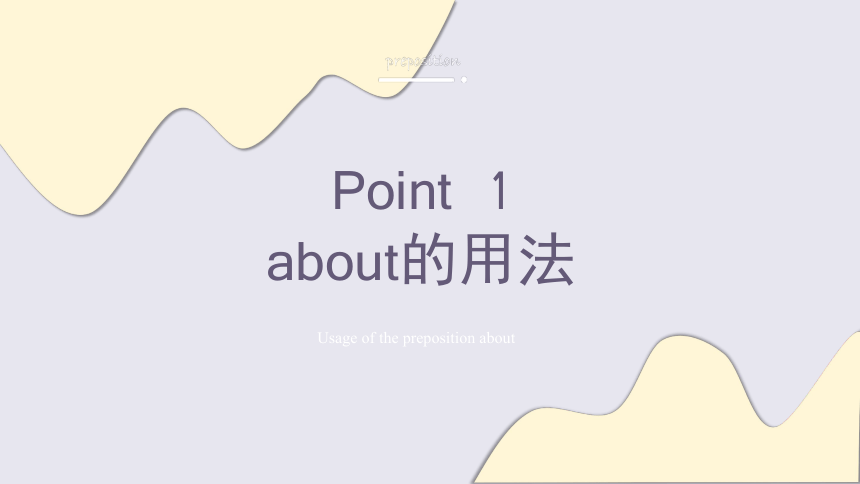
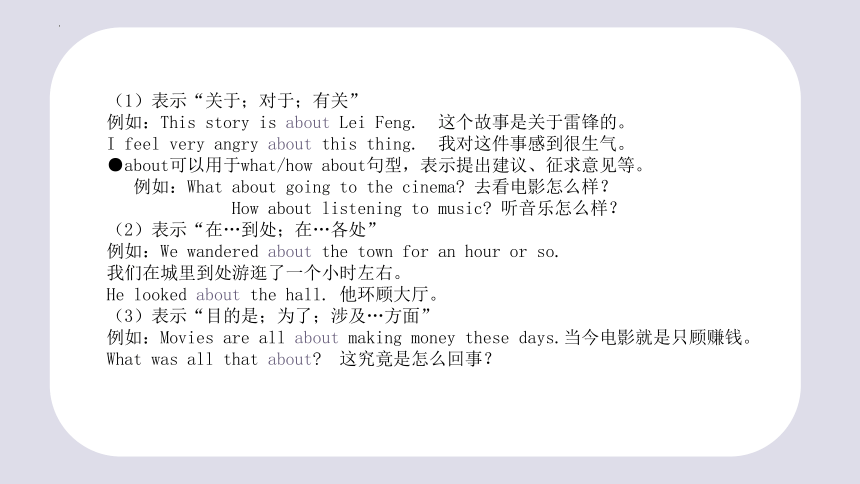
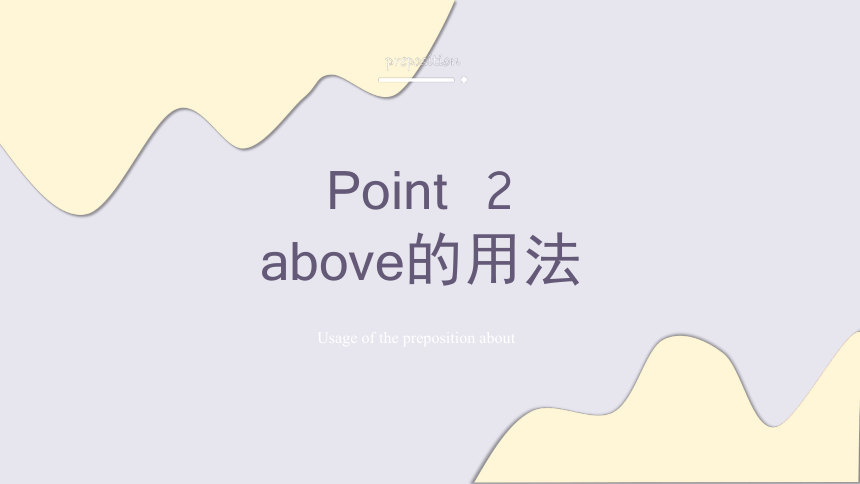
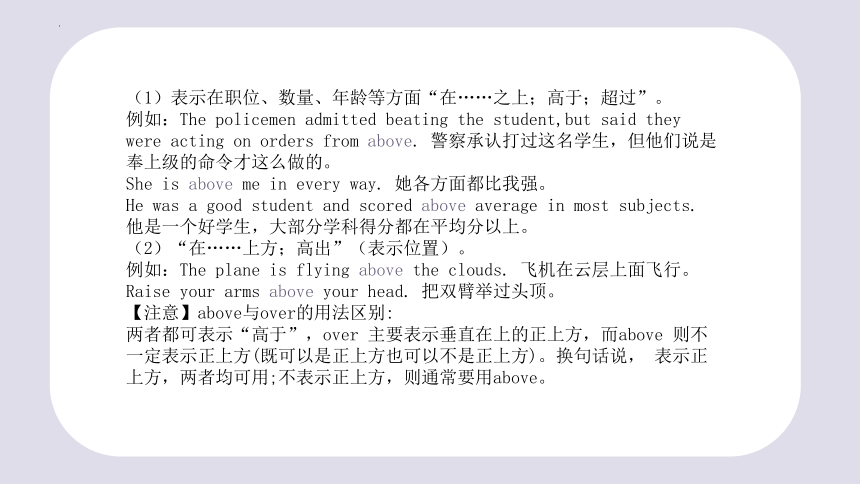
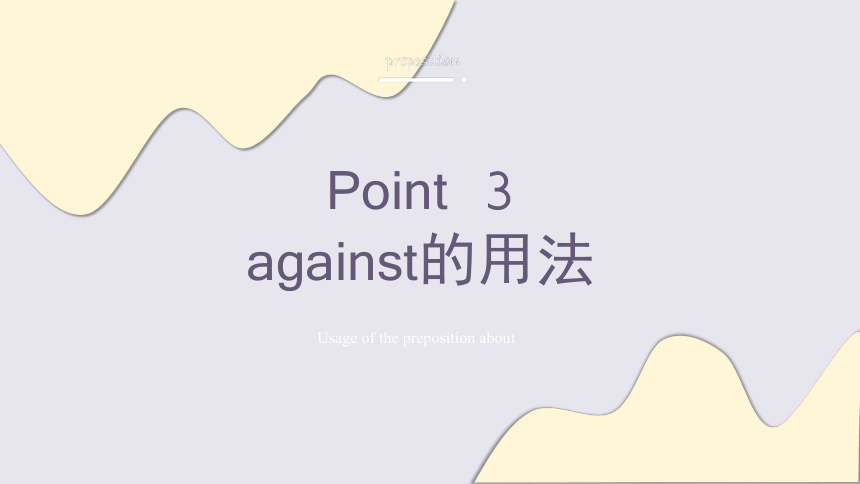
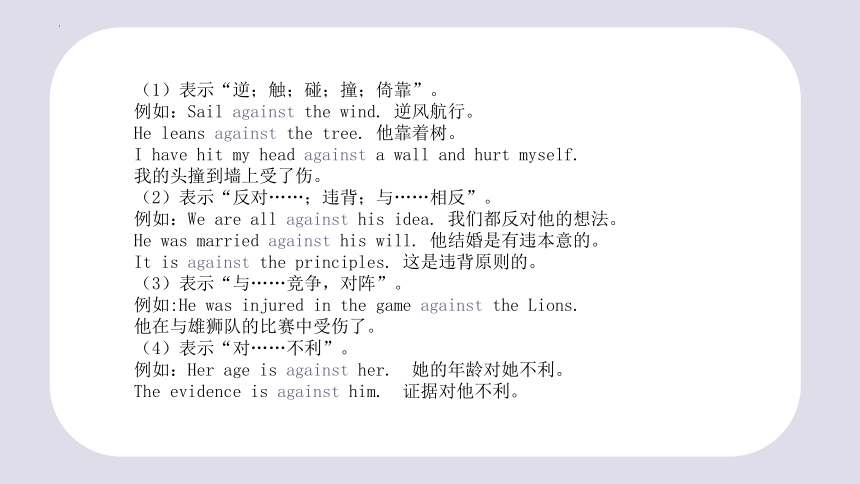
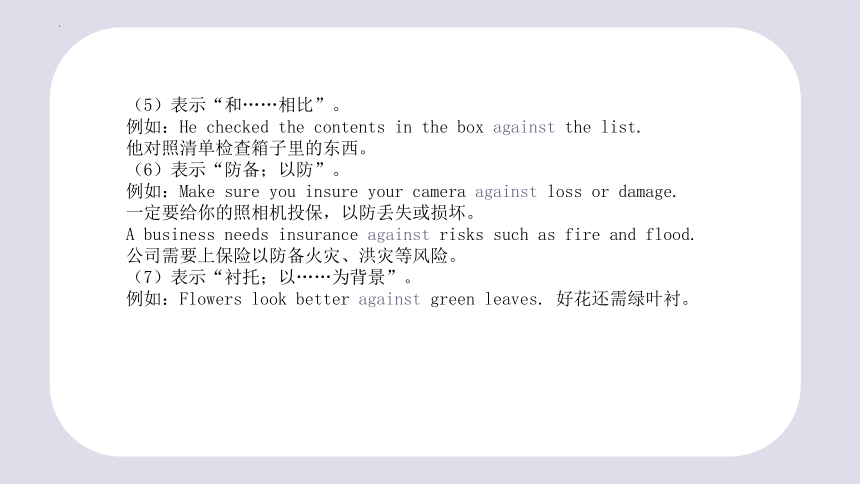
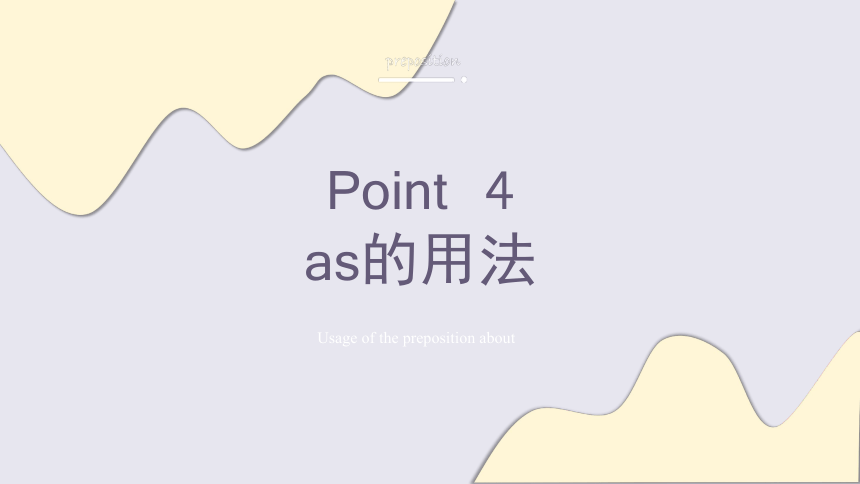
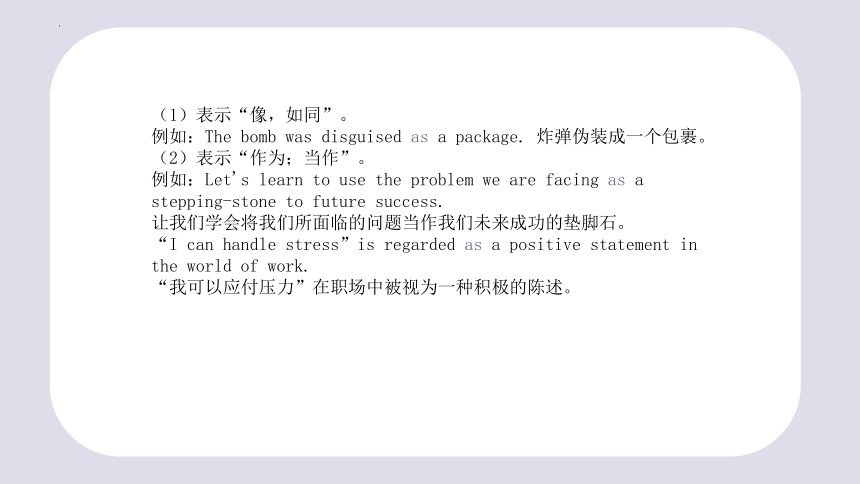
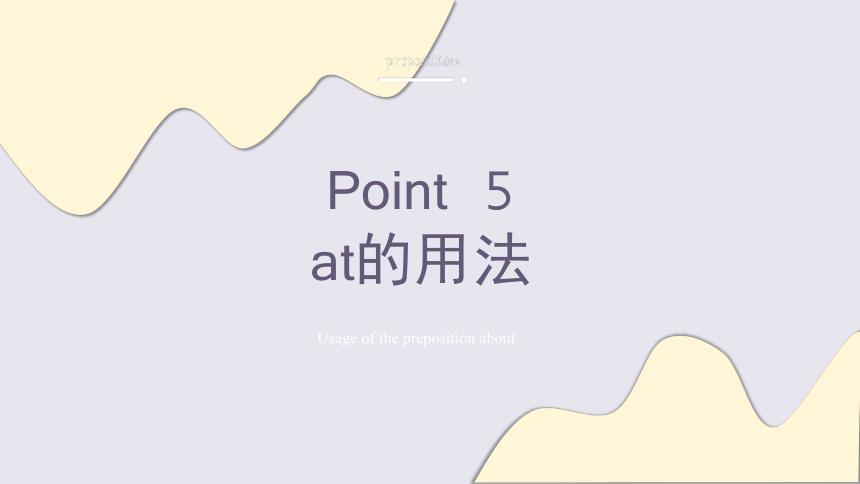
文档简介
(共52张PPT)
介 词
常见介词的用法
preposition
Common preposition usage
目录/content
01 about的用法
02 above的用法
03 against的用法
04 as的用法
05 at的用法
06 by的用法
07 beyond的用法
08 for的用法
09 from的用法
10 of的用法
11 on的用法
12 over的用法
13 with的用法
14 to的用法
15 under的用法
16 through的用法
17 until/till的用法
Point 1
about的用法
Usage of the preposition about
(1)表示“关于;对于;有关”
例如:This story is about Lei Feng. 这个故事是关于雷锋的。
I feel very angry about this thing. 我对这件事感到很生气。
●about可以用于what/how about句型,表示提出建议、征求意见等。
例如:What about going to the cinema 去看电影怎么样?
How about listening to music 听音乐怎么样?
(2)表示“在…到处;在…各处”
例如:We wandered about the town for an hour or so.
我们在城里到处游逛了一个小时左右。
He looked about the hall. 他环顾大厅。
(3)表示“目的是;为了;涉及…方面”
例如:Movies are all about making money these days.当今电影就是只顾赚钱。
What was all that about 这究竟是怎么回事?
Point 2
above的用法
Usage of the preposition about
5.注意above与over的用法区别:两者都可表示“高于”,over 主要表示垂直在上的正上方,而above 则不一定表示正上方(即可以是正上方也可以不是正上方)一换句话说, 表示正上方,两者均可用;不表示正上方,则通常要用above。 如:
(1)表示在职位、数量、年龄等方面“在……之上;高于;超过”。
例如:The policemen admitted beating the student,but said they were acting on orders from above. 警察承认打过这名学生,但他们说是奉上级的命令才这么做的。
She is above me in every way. 她各方面都比我强。
He was a good student and scored above average in most subjects.
他是一个好学生,大部分学科得分都在平均分以上。
(2)“在……上方;高出”(表示位置)。
例如:The plane is flying above the clouds. 飞机在云层上面飞行。
Raise your arms above your head. 把双臂举过头顶。
【注意】above与over的用法区别:
两者都可表示“高于”,over 主要表示垂直在上的正上方,而above 则不一定表示正上方(既可以是正上方也可以不是正上方)。换句话说, 表示正上方,两者均可用;不表示正上方,则通常要用above。
Point 3
against的用法
Usage of the preposition about
(1)表示“逆;触;碰;撞;倚靠”。
例如:Sail against the wind. 逆风航行。
He leans against the tree. 他靠着树。
I have hit my head against a wall and hurt myself.
我的头撞到墙上受了伤。
(2)表示“反对……;违背;与……相反”。
例如:We are all against his idea. 我们都反对他的想法。
He was married against his will. 他结婚是有违本意的。
It is against the principles. 这是违背原则的。
(3)表示“与……竞争,对阵”。
例如:He was injured in the game against the Lions.
他在与雄狮队的比赛中受伤了。
(4)表示“对……不利”。
例如:Her age is against her. 她的年龄对她不利。
The evidence is against him. 证据对他不利。
(5)表示“和……相比”。
例如:He checked the contents in the box against the list.
他对照清单检查箱子里的东西。
(6)表示“防备;以防”。
例如:Make sure you insure your camera against loss or damage.
一定要给你的照相机投保,以防丢失或损坏。
A business needs insurance against risks such as fire and flood.
公司需要上保险以防备火灾、洪灾等风险。
(7)表示“衬托;以……为背景”。
例如:Flowers look better against green leaves. 好花还需绿叶衬。
Point 4
as的用法
Usage of the preposition about
(1)表示“像,如同”。
例如:The bomb was disguised as a package. 炸弹伪装成一个包裹。
(2)表示“作为;当作”。
例如:Let's learn to use the problem we are facing as a stepping-stone to future success.
让我们学会将我们所面临的问题当作我们未来成功的垫脚石。
“I can handle stress”is regarded as a positive statement in the world of work.
“我可以应付压力”在职场中被视为一种积极的陈述。
Point 5
at的用法
Usage of the preposition about
(1)表示“ ....时刻(钟点、时期、岁)”。
例如:The film starts at 8 o'clock. 电影8点钟开始。
100℃ is the temperature at which water will boil.
100℃是水沸腾的温度。
(2)用在表示地点、场合、方位等的名词前,表示“在某处”。
例如:When will you arrive at the office 你什么时候能到办公室呢
The shop is at the corner of the street. 商店在街道的拐角处。
(3)表示“处....状态”。
例如:The two countries are at war. 两国正在交战。
She was hard at work when I arrived. 我到达时,她正努力地工作。
(4)表示“按, 以(价格、速度、数量等)”。
例如:The train runs at about 120 miles an hour.
火车以大约每小时120英里的速度行驶。
Admission is at normal charges and you don‘t need to book.
以正常价格收取票费,无须预约。
(5)表示“……方面”。
例如:She is good at playing the piano. 她擅长弹钢琴。
He is a genius at math. 他是数学方面的天才。
(6)与动词连用表示“向,朝”(表示目标、方向)。
常见的此类动词有aim, throw, guess, laugh,shout,wonder等。
例如:He aimed at the target, fired but missed. 他瞄向目标,开火但没有命中。
Don't throw stones at me. 别朝我扔石子。
(7)与形容词连用,表示“因……产生某种情绪”。
常见的这类词组有be surprised at sth.(对某事惊讶); be astonished at sth. (对某事感到震惊); be shocked at sth. (对某事感到震惊) ; be pleased at doing sth. (对做某事感到满意); be angry at sth. (对某事感到愤怒)等。
例如:They were surprised at the news. 听到那个消息他们很吃惊。
The mother is angry at her son's cheat. 那位母亲对她儿子的欺骗感到很生气。
(8)表示动作、感情的原因,意为“因……而;一听到/看到/想到……就……”。
例如:I always faint at the sight of blood.我一见到血就要犯晕。
Point 6
by的用法
Usage of the preposition about
(1)表示“……旁边,靠近”(与beside意义相近)。
例如:She stood by the window looking out over the fields.
她站在窗边眺望远处的田野。
We are planning to camp by the lake this summer.
今年夏天,我们打算到湖边露营。
(2)表示"用,靠 ;通过,借助于”(表示方法、手段)。
例如:I would say the only way to change things is by doing rather than complaining.
我想说改变事情的唯一方式是靠行动而不是抱怨。
Nowadays some hospitals refer to patients by name, not case number.
现在一些医院提及病人时用名字而不是病例编号。
【注意】置于by之后表示交通工具的名词,前面不加冠词。但指特定的交通工具时则须加冠词。
例如:He left the city by the 10: 30 train. 他乘十点半的火车离开了这座城市。
(3)表示“按照 ,以……计算”(表示数量、尺寸、程度)。
例如:It is eight o'clock by my watch now. 我的表现在是8点钟。
They sold eggs by the dozen. 他们按打卖鸡蛋。
(4)表示“在....之前,不迟于”(表示时间)。
例如:Will you please finish the work by Saturday
请你在星期六之前完成这份工作好吗
By the end of last term, we had learned 3 ,000 words.
到上学期期末,我们已经学了3,000个单词。
It will be dark by the time I get there. 我到那里时,天都要黑了。
(5)表示“ 经过,经由”(表示动作的方向、位置)。
例如:They came through the fields, not by the hill road.
他们是穿过田野而不是沿着山路来的。
I go by the store on my way to work. 我上班经过那家商店。
(6)表示“被,由”( 用于被动语态,后接动作的执行者)。
例如:The book was written by an American writer. 这本书是一位美国作家写的。
(7)表示“抓着(物体或身体的某个部位)”。
例如:grab the hammer by the handle 抓住锤子的柄
She took the old man by the arm and led him across the road.
她搀着那位老人的胳膊,领他过马路。
(8)表示变化或差异的程度。
例如:She missed the train by five minutes. 她差5分钟没赶上火车。
We defeated the opposing team by 3 runs. 我们以三分的优势击败了对方。
(9)表示“ 由(作家、作曲家等)所作”。
例如:a short story by Charles Dickens 查尔斯.狄更斯写的一部短篇小说
(10)表示某事渐渐发生,或某事物/某人迅速地变好变坏等。
例如:Day by day, he grew weaker. 他一天比一 天虚弱。
The financial crisis was growing more serious by the hour.
金融危机每时每刻都在加剧。
Point 7
beyond的用法
Usage of the preposition about
(1)表示“(时间) 过了,比……晚,迟于”。
例如:They arrived beyond nine o'clock. 他们过了9点才到。
Sorry, Madam. You'd better come tomorrow because it’s beyond the visiting hours. 对不起,夫人,你最好明天来,因为已经过了探视时间了。
(2)表示“(位置) 在(或向)……较远的一边”。
例如:I can't see anything beyond the river because of the fog.
由于有雾,河的那边我什么也看不见。
Go about 100 meters beyond the bridge, and you'll find the school on your right side. 过桥后大约走100米,你就会在右边发现那所学校。
(3)表示“超过,非……所能及,超出...的范围(能力)”。
例如:He is living beyond his income. 他的生活人不敷出。
It's beyond me why visitors started respecting the placeless and treated such a beautiful home-like place this way.
我很难理解为什么游客们开始不尊重这个地方了,并且用这种方式对待这样一个美丽又温馨的地方。
(4)表示“无法……”(表示某事不可能做成)。
例如:This computer is beyond repair. 这台电脑无法修理。
The situation is beyond our control. 我们无法控制这一情况。
(5)表示“除……之外”(用于否定句,有时可与except互换)。
例如:I cannot say anything beyond that. 除此之外,我什么也不能说。
He owns nothing beyond/except the clothes on his back.
除了身上穿的衣服以外,他一无所有。
Point 8
for的用法
Usage of the preposition about
(1)表示“对,给,供”(表示对象、用途等)。
例如:You should go to a senior school for girls of your age.
你应该上为你这个年龄的女孩们办的高中。
It is a book for children. 这是本儿童读物。
(2)表示“为了”(表示目的或功能)。
例如: a knife for cutting bread 切面包的刀子
(3)表示“以帮助;为”。
例如:Is there anything I can do for you 我能帮你做些什么吗
Can you read this letter for me 你能为我读这封信吗
(4)表示“向,往”( 表示方向、倾向、能力)。
the train for Beijing 开往北京的列车
The young manager hungered for knowledge of management.
那位年轻的经理渴求管理方面的知识。
Point 5表示“历经,计,达”(表时间、距离、数量)。例如:●The weather has been cold for an entire week.整整一个星期,天气一直很冷。●We drove for miles before we found a phone box我们开车数英里后才找到了一个电话亭。●You can change your job, you can move house, bufriendship is meant to be for life. 你可以调换工作,你可以搬家,但是友谊却是终生的。Point6表示“ 换取....的价钱交换”(表示买卖、交换)。例如:●I didn't have enough money for the book.我身上带的钱不够,无法买这本书。●He agreed to give her 300 dollars for the picture.他同意给她300美元买下那幅画。●I gave him a record ( in exchange) for his stamps.我用一-张唱片交换他的邮票。Point7表示“支持, 赞成”(反义词为against)。例如:●She is all for buying a new car.她非常赞成买部新车。●How many people voted for the proposal 多少人投票赞成这项提议 ●Are you for the plan or against i 你是支持还是反对这个计划 Point8表示“因为,由于”。 例如:. The place is famous for its hot springs.这个地方以温泉著名。●I couldn't speak for laughing.
(5)表示“历经,计,达”(表时间、距离、数量)。
例如:The weather has been cold for an entire week.
整整一个星期,天气一直很冷。
We drove for miles before we found a phone box.
我们开车数英里后才找到了一个电话亭。
You can change your job, you can move house, but friendship is meant to be for life. 你可以调换工作,你可以搬家,但是友谊却是终生的。
(6)表示“ 换取,以……的价钱交换”(表示买卖、交换)。
例如:I didn't have enough money for the book.
我身上带的钱不够,无法买这本书。
He agreed to give her 300 dollars for the picture.
他同意给她300美元买下那幅画。
I gave him a record ( in exchange) for his stamps.
我用一张唱片交换他的邮票。
(7)表示“支持, 赞成”(反义词为against)。
例如:She is all for buying a new car. 她非常赞成买部新车。
How many people voted for the proposal 多少人投票赞成这项提议
Are you for the plan or against it 你是支持还是反对这个计划
(8)表示“因为,由于”。
例如:The place is famous for its hot springs. 这个地方以温泉著名。
I couldn‘t speak for laughing. 我笑得说不出话来。
(9)表示“ 为获取,为得到”。
例如:She came here for my advice. 她来这里征求我的意见。
For more details, telephone their head office.
欲知详情,请致电他们的总部咨询。
(10)表示“至于, 关于,就……而言”,常和与too连用的形容词、副词或与enough连用的形容词、副词、名词等一起使用。
例如:It is quite warm for February.就二月的天气而言,这算是相当暖和了。
She looks young for her age. 以她的年纪来说,她看起来算是年轻的。
It's too cold for swimming today. 今天游泳太冷了。
(11)表示“对于”(表示陈述或问题的对象,也可表示感情表露的对象)。
例如:His greed for money is great.
他极为贪财。
Sad to say, I have no eye for paintings.
遗憾的是,我对绘画没有鉴赏力。
Her deep love for him still remains.
她对他深爱依旧。
Point 9
from的用法
Usage of the preposition about
(1)表示“自……,从……,来自……”(表示起点、来源)。
例如:Shirley, a real book lover, often brings home many books to read from the library.
雪莉,一个真正爱读书的人,经常从图书馆借许多书回家阅读。
He appealed for information from anyone who saw the attackers.
他向任何看见袭击者的人征集信息。
(2)表示“从……开始”(表示时间)。
例如:They start work from 8 o'clock in the morning.
他们从早上八点开始工作。
From now on she is free. 从今以后她自由了。
(3)表示“离”(表示间距、距离)。
例如:It's about an hour and a half from the destination.
距离目的地还有一个半小时的路程。
Her long absence from school made me anxious.
她长期离校使我很担心。
(4)表示“因为,由于”(表示原因、动机)。
例如: Deaths from heart diseases continue to rise every year.
因心脏病死亡的人数年年上涨。
He was rushed to hospital for suffering from severe burns.
他因严重烧伤而被紧急送往医院。
(5)表示“ 由……制成"(表示看不见原材料)。
例如:They make wine from grapes. 他们用葡萄酿酒。
The luxurious resort is built from the island's native coral stone.
这个豪华的度假胜地是用该岛的天然珊瑚石建造的。
(6)表示“使免于,使免受”(表示除去、免去、阻止)。
例如:These books were saved from damage. 这些书没有损坏。
(7)表示“区别……和……(表示区别)。
例如:. Can you tell Tom from his twin brother
你能分得出汤姆和他的孪生弟弟吗
Point 10
of的用法
Usage of the preposition about
(1)表示“……的”(表示所属关系)。
例如:a friend of her 她的一个朋友
(2)表示人或物的特征、性质。
例如:the beauty of the scenery 景色之美
He is a man of ability. 他是一个 有能力的人。
Your help is of great value to us. 你的帮助对我们很有价值。
【知识拓展】①"of+抽象名词”可代替意思相同的形容词。
例如:a man of importance = an important man 一个重要人物
a matter of great importance = a very important matter 一件极重要的事情
②"of + the same+名词"用于be动词之后时,可将of省略。
例如:She and I are (of) the same age. 她和我同龄。
(3)用来具体说明所指的是某类事物中的哪一个。
例如: Mr. Smith left for New York in the month of September.
史密斯先生9月份动身去纽约了。
She was born in the city of Beijing. 她生于北京。
(4)“用……做成,由……组成”(表材料、所含之物)。
例如:The local decorations are made of wood and straw.
当地的饰品是用木头和稻草制成的。
Waler consists of hydrogen and oxygen.
水是由氢和氧两种元索组成的。
a cup of tea 一杯茶
(5)表示动作对象,常与 hear,think,talk,read,approve等连用。
例如:I have not heard of him since then. 从那以后我就没有他的消息了。 Think of a number, any number. 想一个数字,随便一个。
The man robbed me of my bag and ran away.
那个男子抢了我的包后逃跑了。
(6)用于表示动作或施动者的名词后,说明动作的对象,或用于表示动作的名词后,说明施动者。
例如:Gambling will be the ruin of him. 赌博会把他毁掉。
the ringing of the bell 铃响了
(7)用于对某人的行为发表看法。
例如:It was careless of him to lose his way.他太粗心了,竟然迷了路。
Point 11
on的用法
Usage of the preposition about
(1)表示“在……上”(指在某物的表面上或构成某物体表面的一部分)。
例如:There's a painting of his father on the wall.
墙上有一张他父亲的肖像画。
I‘d like to take a boat on the River Nile.
我很想乘船行驶在尼罗河上。
(2)表示“从事……中,处于……情况中”(用于说明活动或状态)。
例如:He saw a soldier on watch at the door.
他看见门口有一个士兵在站岗。
She is still on holiday. 她仍在休假。
He went there on business. 他到那儿出差去了。
(3)表示“ 在(交通工具)上”,有时也表示交通方式。
例如:She is on the plane from Beijing. 她在来自北京的飞机上。
travel on the bus 乘公共汽车
(4)表示"在(某一日期、具体某一天,或在某一天的上午、下午、晚上)”。
例如:on Sunday 在周日
She was born on the morning of April 18th, 1986.
她出生于1986年4月18日的早上。
(5)“关于,涉及",表示比about更专业的内容。
例如:He will give a talk on the economic situation.
他将做关于经济形势的报告。
They differ from each other on some important matters.
他们在一些重要问题上彼此有分歧。
(6)“对着,朝"(表示动作方向)。
例如:It's as if all eyes are focused on me.
好像所有的眼睛都盯着我似的。
They are making an attack on the enemy.
他们正在向敌人发起攻击。
(7)表示“由……支撑着”。
例如:He can stand on his head. 他可以倒立。
(8)表示“凭……,靠……;根据,以……为基础”。
例如:It is a happy day when you’re allowed to drive a car on your own.
你能够独自驾车的那一天是非常快乐的。
(9)“一……就”( 表示时间,后接动名词或名词 )。
例如:On hearing the news of the air attack,most foreigners headed for the border.
一听到空袭的消息,大多数外国人便前往边境。
On arriving home I discovered they had gone.
我一到家就发现他们已经离开了。
(10)表示“使用,通过,借助于”。
例如:They talked on the telephone. 他们通过电话交谈。
(11)表示“(身上)带着”。
例如:Have you got any money on you 你身上带钱了吗
(12)表示“在(群体或团队)中;在(名单)上”。
例如:Mr. Edwards is no longer on the staff here.
爱德华兹先生不再是这里的员工了。
Point 12
over的用法
Usage of the preposition about
(1)表示“在……上方,在……上空”(与下方物体不接触)。
例如:The sign over the door said “ Mind your head”.
门上方的警示牌写着“小心碰头”。
(2)表示“高于,超过(某一数目、数量或程度)”。
例如:The game is designed for children over six years old.
这款游戏是为六岁以上的儿童设计的。
He stayed in America for over a year. 他在美国呆了一年多。
(3)表示“(从疾病或糟糕的经历或情形中)恢复过来,熬过来”。
例如:I think we’re over the worst of the crisis now.
我想我们现在已经熬过了最危急的关头。
(4)表示“ 通过(无线电、电话等)"。
例如:He learned English over the radio. 他通过收音机学英语。
(5)表示“ 在……期间”。
例如:I'm sorry I didn't phone you, but I've been very busy over the past couple of weeks.
对不起,我没给你打电话,只因为在过去的这几周里,我一直很忙。
Let's discuss the contract over lunch. 咱们边吃午饭边商谈合同吧。
(6)表示“ 覆盖在……上面”。
例如:Mother laid a blanket over the child. 母亲给孩子盖上毯子。
She wore a large jacket over her sweater. 她在毛衣外面罩了件宽大的夹克。
Mother threw a sheet over the bed. 母亲在床上铺了一条床单。
(7)表示“穿越,从一边到另一边;翻越;到另一边"(表示动作方向)。
例如:a bridge over the river 横跨河面的桥.
He ran over the grass. 他跑过草地。
He can jump over the wall. 他能够跳过那堵墙。
He was already over the gate waiting for me to climb over.
他已经越过大门,正在等我爬过去。
(8)表示“与……有关,关于”。
例如:an argument over the matter 关于那件事的争论
Point 13
with的用法
Usage of the preposition about
(1)表示“具有,带有”(表示从属关系)。
例如:He married a woman with a large fortune. 他娶了一位很有钱的女子。
The dictionary is what I want, but I don't have enough money with me.
这本字典正是我想要的,但是我没带这么多钱。
China is a country with a long history. 中国是一个历史悠久的国家。
(2)表示“和……在一起”。
例如:He often goes fishing with his little son.
他经常和他的小儿子一起去钓鱼。
They are discussing the matter with the foreign friends.
他们在同外国朋友们一起讨论这个问题。
(3)表示“用,以 , 借”(表示方式、手段等)。
例如:Don't write with a pencil. 别用铅笔写。
(4)表示“尽管,虽然"(表示让步)。
例如:With all her money, she is not happy. 她虽然有很多钱,但不幸福。
With all his achievements, he remains modest.
他尽管很有成就,但仍然很谦虚。
(5)表示“因为,由于”(表示原因)。
例如:He is down with high fever. 他发高烧病倒了。
His face turned red with anger. 他的脸气得变红了。
(6)表示“对,对....来说,关于”(表示对象)。
例如:I am pleased with what you have done. 我对你所做的感到满意。
Such an excuse won't work with me. 这样的借口对我不起作用。
(7)with与“名词/代词+副词(短语)/形容词(短语)/介词(短语)/非谓语动词(短语)”连用,构成with复合结构。
例如:You have no idea how she finished the relay race with her foot wounded so much. 你不知道她在脚伤那么严重的情况下是怎样跑完接力赛的。
He lay awake on the bed, with his eyes wide open.
他醒着躺在床上,眼睛睁得大大的。
He thought for a while with his eyes shut. 他闭着眼睛思考了片刻。
She ran and ran with beads of sweat running down her face.
她不停地年跑,汗珠顺着脸颊流下来。
(8)表示“(时间)与……同时,随着”。
例如:With these words, he went out. 说着这些话,他就出去了。
With the development of modern agriculture and industry,more and more waste is produced. 现代农业和工业的发展产生了越来越多的垃圾。
Times have changed, so we need to change with them.
时代改变了,所以我们需要随着时代而改变。
(9)表示“包括,还有”。
例如:Three nights’ accommodation with breakfast and evening meal cost us just over $500.
包括早餐和晚餐,三院的住宿只花了我们500美元多一点。
Point 14
to的用法
Usage of the preposition about
(1)表示“向,朝 , 往 , 对着(某方向或某处)”。
例如:She is walking to the office. 她正朝办公室走去。
She has gone to the airport to meet a friend. 她去机场接一位朋友了。
(2)表示“( 离某件事或某时间)还差……时间”。
例如:The train arrived at ten to six and we caught it finally.
火车在5:50到达,我们最终赶上了。
It's only three weeks to Christmas. 离圣诞节只有三个星期了。
(3)表示“比,比较”(引出比较或比率的第二部分)。
例如:They won the game by 5 to 4. 他们以5:4赢了那场比赛。
I prefer oranges to apples. 我比较喜欢橙子,而不喜欢苹果。
(4)表示“属于,归于 ,关于”(表示对象关系)。
例如:This pen belongs to my father. 这支钢笔是我爸爸的。
The hospital is attached to the university. 那家医院附属于该大学。
(5)表示“给,予,向"(引出接受者)。
例如:She lent some money to me. 她借给了我一些钱。
He is writing a letter to his family. 他正在给家人写信。
Point 15
under的用法
Usage of the preposition about
(1)表示“低于,少于,在……之下,不足”(多指数量、级别、程度、年龄等)。
例如:I spent just under four hours a day seeing customers.
我一天接待顾客所花的时间将近四个小时。
Children under six years old are admitted free.
未满六岁的儿童可免费入场。
(2)表示“在……下面,在……之下”(多指位置,反义词是over )。
例如:She was carrying her handbag under her arm.
她胳膊底下夹着她的手提包。
Her cat came out from under the table. 她的猫从桌子下面钻了出来。
(3)表示“在……领导下,在……指导下”(多指从属关系)。
例如:The restaurant is under new management.
饭店现在处于新管理层的领导之下。
She studied the piano under the famous singer.
她在那位著名歌唱家的指导下学过钢琴。
(4)表示“在……期间,在……过程中”(多指过程)。
例如:The hotel is under construction. 这座旅馆正在建设中。
The question is still under discussion. 那个问题仍在讨论中。
The patient is under treatment. 这个病人在治疗中。
(5)表示“在……的影响下”。
例如:They are under a lot of pressure. 他们压力很大。
under the influence of drugs 在药物的影响下
Point 16
through的用法
Usage of the preposition about
(1)表示“自始至终,从头到尾”(表示时间)。
例如:Graduation is a good time to thank those who have helped you through the tough years.
毕业时是感谢那些帮助你度过艰难岁月的人们的好时机。
I had to sit through the movie although it wasn’t interesting at all.
虽然电影很无趣,我却还得从头坐到尾。
(2)表示“ 通过,经过,穿过”(表示空间)。
例如:Light comes in through the window. 光线从窗户射进来。
They were suddenly plunged into darkness as the train went through the tunnel.
当火车穿过隧道时,他们一下子陷人黑暗之中。
(3)表示“因为, 由于”(表示原因)。
例如:He made the mistake through carelessness. 他由于粗心而出了错。
He lost his position through his own mistakes. 他因为自己的过失而丢掉了工作。(4)表示“凭借,通过,经由”(表示方式、手段)。
例如:I got my first job though an employment agency.
我通过家职业介绍所获得了第一份工作。
Point 17
until/till的用法
Usage of the preposition about
until / till都表示“直到……”,作介词时,二者用法相同,只是till在口语中使用较多。用在肯定句中,意为“到……(的时候 )为止”,谓语动词一般是延续性的,表示这个动词的动作一直延续到until / till所表示的时间为止;用在否定句中,意为“直到……才”,表示这个动词的动作直到until / till所表示的时间才发生。
例如:They talked until / till dawn.
他们一直谈到天亮。
They didn't find her until / till the next day.
他们直到第二天才找到她。
介 词
常见介词的用法
preposition
Common preposition usage
目录/content
01 about的用法
02 above的用法
03 against的用法
04 as的用法
05 at的用法
06 by的用法
07 beyond的用法
08 for的用法
09 from的用法
10 of的用法
11 on的用法
12 over的用法
13 with的用法
14 to的用法
15 under的用法
16 through的用法
17 until/till的用法
Point 1
about的用法
Usage of the preposition about
(1)表示“关于;对于;有关”
例如:This story is about Lei Feng. 这个故事是关于雷锋的。
I feel very angry about this thing. 我对这件事感到很生气。
●about可以用于what/how about句型,表示提出建议、征求意见等。
例如:What about going to the cinema 去看电影怎么样?
How about listening to music 听音乐怎么样?
(2)表示“在…到处;在…各处”
例如:We wandered about the town for an hour or so.
我们在城里到处游逛了一个小时左右。
He looked about the hall. 他环顾大厅。
(3)表示“目的是;为了;涉及…方面”
例如:Movies are all about making money these days.当今电影就是只顾赚钱。
What was all that about 这究竟是怎么回事?
Point 2
above的用法
Usage of the preposition about
5.注意above与over的用法区别:两者都可表示“高于”,over 主要表示垂直在上的正上方,而above 则不一定表示正上方(即可以是正上方也可以不是正上方)一换句话说, 表示正上方,两者均可用;不表示正上方,则通常要用above。 如:
(1)表示在职位、数量、年龄等方面“在……之上;高于;超过”。
例如:The policemen admitted beating the student,but said they were acting on orders from above. 警察承认打过这名学生,但他们说是奉上级的命令才这么做的。
She is above me in every way. 她各方面都比我强。
He was a good student and scored above average in most subjects.
他是一个好学生,大部分学科得分都在平均分以上。
(2)“在……上方;高出”(表示位置)。
例如:The plane is flying above the clouds. 飞机在云层上面飞行。
Raise your arms above your head. 把双臂举过头顶。
【注意】above与over的用法区别:
两者都可表示“高于”,over 主要表示垂直在上的正上方,而above 则不一定表示正上方(既可以是正上方也可以不是正上方)。换句话说, 表示正上方,两者均可用;不表示正上方,则通常要用above。
Point 3
against的用法
Usage of the preposition about
(1)表示“逆;触;碰;撞;倚靠”。
例如:Sail against the wind. 逆风航行。
He leans against the tree. 他靠着树。
I have hit my head against a wall and hurt myself.
我的头撞到墙上受了伤。
(2)表示“反对……;违背;与……相反”。
例如:We are all against his idea. 我们都反对他的想法。
He was married against his will. 他结婚是有违本意的。
It is against the principles. 这是违背原则的。
(3)表示“与……竞争,对阵”。
例如:He was injured in the game against the Lions.
他在与雄狮队的比赛中受伤了。
(4)表示“对……不利”。
例如:Her age is against her. 她的年龄对她不利。
The evidence is against him. 证据对他不利。
(5)表示“和……相比”。
例如:He checked the contents in the box against the list.
他对照清单检查箱子里的东西。
(6)表示“防备;以防”。
例如:Make sure you insure your camera against loss or damage.
一定要给你的照相机投保,以防丢失或损坏。
A business needs insurance against risks such as fire and flood.
公司需要上保险以防备火灾、洪灾等风险。
(7)表示“衬托;以……为背景”。
例如:Flowers look better against green leaves. 好花还需绿叶衬。
Point 4
as的用法
Usage of the preposition about
(1)表示“像,如同”。
例如:The bomb was disguised as a package. 炸弹伪装成一个包裹。
(2)表示“作为;当作”。
例如:Let's learn to use the problem we are facing as a stepping-stone to future success.
让我们学会将我们所面临的问题当作我们未来成功的垫脚石。
“I can handle stress”is regarded as a positive statement in the world of work.
“我可以应付压力”在职场中被视为一种积极的陈述。
Point 5
at的用法
Usage of the preposition about
(1)表示“ ....时刻(钟点、时期、岁)”。
例如:The film starts at 8 o'clock. 电影8点钟开始。
100℃ is the temperature at which water will boil.
100℃是水沸腾的温度。
(2)用在表示地点、场合、方位等的名词前,表示“在某处”。
例如:When will you arrive at the office 你什么时候能到办公室呢
The shop is at the corner of the street. 商店在街道的拐角处。
(3)表示“处....状态”。
例如:The two countries are at war. 两国正在交战。
She was hard at work when I arrived. 我到达时,她正努力地工作。
(4)表示“按, 以(价格、速度、数量等)”。
例如:The train runs at about 120 miles an hour.
火车以大约每小时120英里的速度行驶。
Admission is at normal charges and you don‘t need to book.
以正常价格收取票费,无须预约。
(5)表示“……方面”。
例如:She is good at playing the piano. 她擅长弹钢琴。
He is a genius at math. 他是数学方面的天才。
(6)与动词连用表示“向,朝”(表示目标、方向)。
常见的此类动词有aim, throw, guess, laugh,shout,wonder等。
例如:He aimed at the target, fired but missed. 他瞄向目标,开火但没有命中。
Don't throw stones at me. 别朝我扔石子。
(7)与形容词连用,表示“因……产生某种情绪”。
常见的这类词组有be surprised at sth.(对某事惊讶); be astonished at sth. (对某事感到震惊); be shocked at sth. (对某事感到震惊) ; be pleased at doing sth. (对做某事感到满意); be angry at sth. (对某事感到愤怒)等。
例如:They were surprised at the news. 听到那个消息他们很吃惊。
The mother is angry at her son's cheat. 那位母亲对她儿子的欺骗感到很生气。
(8)表示动作、感情的原因,意为“因……而;一听到/看到/想到……就……”。
例如:I always faint at the sight of blood.我一见到血就要犯晕。
Point 6
by的用法
Usage of the preposition about
(1)表示“……旁边,靠近”(与beside意义相近)。
例如:She stood by the window looking out over the fields.
她站在窗边眺望远处的田野。
We are planning to camp by the lake this summer.
今年夏天,我们打算到湖边露营。
(2)表示"用,靠 ;通过,借助于”(表示方法、手段)。
例如:I would say the only way to change things is by doing rather than complaining.
我想说改变事情的唯一方式是靠行动而不是抱怨。
Nowadays some hospitals refer to patients by name, not case number.
现在一些医院提及病人时用名字而不是病例编号。
【注意】置于by之后表示交通工具的名词,前面不加冠词。但指特定的交通工具时则须加冠词。
例如:He left the city by the 10: 30 train. 他乘十点半的火车离开了这座城市。
(3)表示“按照 ,以……计算”(表示数量、尺寸、程度)。
例如:It is eight o'clock by my watch now. 我的表现在是8点钟。
They sold eggs by the dozen. 他们按打卖鸡蛋。
(4)表示“在....之前,不迟于”(表示时间)。
例如:Will you please finish the work by Saturday
请你在星期六之前完成这份工作好吗
By the end of last term, we had learned 3 ,000 words.
到上学期期末,我们已经学了3,000个单词。
It will be dark by the time I get there. 我到那里时,天都要黑了。
(5)表示“ 经过,经由”(表示动作的方向、位置)。
例如:They came through the fields, not by the hill road.
他们是穿过田野而不是沿着山路来的。
I go by the store on my way to work. 我上班经过那家商店。
(6)表示“被,由”( 用于被动语态,后接动作的执行者)。
例如:The book was written by an American writer. 这本书是一位美国作家写的。
(7)表示“抓着(物体或身体的某个部位)”。
例如:grab the hammer by the handle 抓住锤子的柄
She took the old man by the arm and led him across the road.
她搀着那位老人的胳膊,领他过马路。
(8)表示变化或差异的程度。
例如:She missed the train by five minutes. 她差5分钟没赶上火车。
We defeated the opposing team by 3 runs. 我们以三分的优势击败了对方。
(9)表示“ 由(作家、作曲家等)所作”。
例如:a short story by Charles Dickens 查尔斯.狄更斯写的一部短篇小说
(10)表示某事渐渐发生,或某事物/某人迅速地变好变坏等。
例如:Day by day, he grew weaker. 他一天比一 天虚弱。
The financial crisis was growing more serious by the hour.
金融危机每时每刻都在加剧。
Point 7
beyond的用法
Usage of the preposition about
(1)表示“(时间) 过了,比……晚,迟于”。
例如:They arrived beyond nine o'clock. 他们过了9点才到。
Sorry, Madam. You'd better come tomorrow because it’s beyond the visiting hours. 对不起,夫人,你最好明天来,因为已经过了探视时间了。
(2)表示“(位置) 在(或向)……较远的一边”。
例如:I can't see anything beyond the river because of the fog.
由于有雾,河的那边我什么也看不见。
Go about 100 meters beyond the bridge, and you'll find the school on your right side. 过桥后大约走100米,你就会在右边发现那所学校。
(3)表示“超过,非……所能及,超出...的范围(能力)”。
例如:He is living beyond his income. 他的生活人不敷出。
It's beyond me why visitors started respecting the placeless and treated such a beautiful home-like place this way.
我很难理解为什么游客们开始不尊重这个地方了,并且用这种方式对待这样一个美丽又温馨的地方。
(4)表示“无法……”(表示某事不可能做成)。
例如:This computer is beyond repair. 这台电脑无法修理。
The situation is beyond our control. 我们无法控制这一情况。
(5)表示“除……之外”(用于否定句,有时可与except互换)。
例如:I cannot say anything beyond that. 除此之外,我什么也不能说。
He owns nothing beyond/except the clothes on his back.
除了身上穿的衣服以外,他一无所有。
Point 8
for的用法
Usage of the preposition about
(1)表示“对,给,供”(表示对象、用途等)。
例如:You should go to a senior school for girls of your age.
你应该上为你这个年龄的女孩们办的高中。
It is a book for children. 这是本儿童读物。
(2)表示“为了”(表示目的或功能)。
例如: a knife for cutting bread 切面包的刀子
(3)表示“以帮助;为”。
例如:Is there anything I can do for you 我能帮你做些什么吗
Can you read this letter for me 你能为我读这封信吗
(4)表示“向,往”( 表示方向、倾向、能力)。
the train for Beijing 开往北京的列车
The young manager hungered for knowledge of management.
那位年轻的经理渴求管理方面的知识。
Point 5表示“历经,计,达”(表时间、距离、数量)。例如:●The weather has been cold for an entire week.整整一个星期,天气一直很冷。●We drove for miles before we found a phone box我们开车数英里后才找到了一个电话亭。●You can change your job, you can move house, bufriendship is meant to be for life. 你可以调换工作,你可以搬家,但是友谊却是终生的。Point6表示“ 换取....的价钱交换”(表示买卖、交换)。例如:●I didn't have enough money for the book.我身上带的钱不够,无法买这本书。●He agreed to give her 300 dollars for the picture.他同意给她300美元买下那幅画。●I gave him a record ( in exchange) for his stamps.我用一-张唱片交换他的邮票。Point7表示“支持, 赞成”(反义词为against)。例如:●She is all for buying a new car.她非常赞成买部新车。●How many people voted for the proposal 多少人投票赞成这项提议 ●Are you for the plan or against i 你是支持还是反对这个计划 Point8表示“因为,由于”。 例如:. The place is famous for its hot springs.这个地方以温泉著名。●I couldn't speak for laughing.
(5)表示“历经,计,达”(表时间、距离、数量)。
例如:The weather has been cold for an entire week.
整整一个星期,天气一直很冷。
We drove for miles before we found a phone box.
我们开车数英里后才找到了一个电话亭。
You can change your job, you can move house, but friendship is meant to be for life. 你可以调换工作,你可以搬家,但是友谊却是终生的。
(6)表示“ 换取,以……的价钱交换”(表示买卖、交换)。
例如:I didn't have enough money for the book.
我身上带的钱不够,无法买这本书。
He agreed to give her 300 dollars for the picture.
他同意给她300美元买下那幅画。
I gave him a record ( in exchange) for his stamps.
我用一张唱片交换他的邮票。
(7)表示“支持, 赞成”(反义词为against)。
例如:She is all for buying a new car. 她非常赞成买部新车。
How many people voted for the proposal 多少人投票赞成这项提议
Are you for the plan or against it 你是支持还是反对这个计划
(8)表示“因为,由于”。
例如:The place is famous for its hot springs. 这个地方以温泉著名。
I couldn‘t speak for laughing. 我笑得说不出话来。
(9)表示“ 为获取,为得到”。
例如:She came here for my advice. 她来这里征求我的意见。
For more details, telephone their head office.
欲知详情,请致电他们的总部咨询。
(10)表示“至于, 关于,就……而言”,常和与too连用的形容词、副词或与enough连用的形容词、副词、名词等一起使用。
例如:It is quite warm for February.就二月的天气而言,这算是相当暖和了。
She looks young for her age. 以她的年纪来说,她看起来算是年轻的。
It's too cold for swimming today. 今天游泳太冷了。
(11)表示“对于”(表示陈述或问题的对象,也可表示感情表露的对象)。
例如:His greed for money is great.
他极为贪财。
Sad to say, I have no eye for paintings.
遗憾的是,我对绘画没有鉴赏力。
Her deep love for him still remains.
她对他深爱依旧。
Point 9
from的用法
Usage of the preposition about
(1)表示“自……,从……,来自……”(表示起点、来源)。
例如:Shirley, a real book lover, often brings home many books to read from the library.
雪莉,一个真正爱读书的人,经常从图书馆借许多书回家阅读。
He appealed for information from anyone who saw the attackers.
他向任何看见袭击者的人征集信息。
(2)表示“从……开始”(表示时间)。
例如:They start work from 8 o'clock in the morning.
他们从早上八点开始工作。
From now on she is free. 从今以后她自由了。
(3)表示“离”(表示间距、距离)。
例如:It's about an hour and a half from the destination.
距离目的地还有一个半小时的路程。
Her long absence from school made me anxious.
她长期离校使我很担心。
(4)表示“因为,由于”(表示原因、动机)。
例如: Deaths from heart diseases continue to rise every year.
因心脏病死亡的人数年年上涨。
He was rushed to hospital for suffering from severe burns.
他因严重烧伤而被紧急送往医院。
(5)表示“ 由……制成"(表示看不见原材料)。
例如:They make wine from grapes. 他们用葡萄酿酒。
The luxurious resort is built from the island's native coral stone.
这个豪华的度假胜地是用该岛的天然珊瑚石建造的。
(6)表示“使免于,使免受”(表示除去、免去、阻止)。
例如:These books were saved from damage. 这些书没有损坏。
(7)表示“区别……和……(表示区别)。
例如:. Can you tell Tom from his twin brother
你能分得出汤姆和他的孪生弟弟吗
Point 10
of的用法
Usage of the preposition about
(1)表示“……的”(表示所属关系)。
例如:a friend of her 她的一个朋友
(2)表示人或物的特征、性质。
例如:the beauty of the scenery 景色之美
He is a man of ability. 他是一个 有能力的人。
Your help is of great value to us. 你的帮助对我们很有价值。
【知识拓展】①"of+抽象名词”可代替意思相同的形容词。
例如:a man of importance = an important man 一个重要人物
a matter of great importance = a very important matter 一件极重要的事情
②"of + the same+名词"用于be动词之后时,可将of省略。
例如:She and I are (of) the same age. 她和我同龄。
(3)用来具体说明所指的是某类事物中的哪一个。
例如: Mr. Smith left for New York in the month of September.
史密斯先生9月份动身去纽约了。
She was born in the city of Beijing. 她生于北京。
(4)“用……做成,由……组成”(表材料、所含之物)。
例如:The local decorations are made of wood and straw.
当地的饰品是用木头和稻草制成的。
Waler consists of hydrogen and oxygen.
水是由氢和氧两种元索组成的。
a cup of tea 一杯茶
(5)表示动作对象,常与 hear,think,talk,read,approve等连用。
例如:I have not heard of him since then. 从那以后我就没有他的消息了。 Think of a number, any number. 想一个数字,随便一个。
The man robbed me of my bag and ran away.
那个男子抢了我的包后逃跑了。
(6)用于表示动作或施动者的名词后,说明动作的对象,或用于表示动作的名词后,说明施动者。
例如:Gambling will be the ruin of him. 赌博会把他毁掉。
the ringing of the bell 铃响了
(7)用于对某人的行为发表看法。
例如:It was careless of him to lose his way.他太粗心了,竟然迷了路。
Point 11
on的用法
Usage of the preposition about
(1)表示“在……上”(指在某物的表面上或构成某物体表面的一部分)。
例如:There's a painting of his father on the wall.
墙上有一张他父亲的肖像画。
I‘d like to take a boat on the River Nile.
我很想乘船行驶在尼罗河上。
(2)表示“从事……中,处于……情况中”(用于说明活动或状态)。
例如:He saw a soldier on watch at the door.
他看见门口有一个士兵在站岗。
She is still on holiday. 她仍在休假。
He went there on business. 他到那儿出差去了。
(3)表示“ 在(交通工具)上”,有时也表示交通方式。
例如:She is on the plane from Beijing. 她在来自北京的飞机上。
travel on the bus 乘公共汽车
(4)表示"在(某一日期、具体某一天,或在某一天的上午、下午、晚上)”。
例如:on Sunday 在周日
She was born on the morning of April 18th, 1986.
她出生于1986年4月18日的早上。
(5)“关于,涉及",表示比about更专业的内容。
例如:He will give a talk on the economic situation.
他将做关于经济形势的报告。
They differ from each other on some important matters.
他们在一些重要问题上彼此有分歧。
(6)“对着,朝"(表示动作方向)。
例如:It's as if all eyes are focused on me.
好像所有的眼睛都盯着我似的。
They are making an attack on the enemy.
他们正在向敌人发起攻击。
(7)表示“由……支撑着”。
例如:He can stand on his head. 他可以倒立。
(8)表示“凭……,靠……;根据,以……为基础”。
例如:It is a happy day when you’re allowed to drive a car on your own.
你能够独自驾车的那一天是非常快乐的。
(9)“一……就”( 表示时间,后接动名词或名词 )。
例如:On hearing the news of the air attack,most foreigners headed for the border.
一听到空袭的消息,大多数外国人便前往边境。
On arriving home I discovered they had gone.
我一到家就发现他们已经离开了。
(10)表示“使用,通过,借助于”。
例如:They talked on the telephone. 他们通过电话交谈。
(11)表示“(身上)带着”。
例如:Have you got any money on you 你身上带钱了吗
(12)表示“在(群体或团队)中;在(名单)上”。
例如:Mr. Edwards is no longer on the staff here.
爱德华兹先生不再是这里的员工了。
Point 12
over的用法
Usage of the preposition about
(1)表示“在……上方,在……上空”(与下方物体不接触)。
例如:The sign over the door said “ Mind your head”.
门上方的警示牌写着“小心碰头”。
(2)表示“高于,超过(某一数目、数量或程度)”。
例如:The game is designed for children over six years old.
这款游戏是为六岁以上的儿童设计的。
He stayed in America for over a year. 他在美国呆了一年多。
(3)表示“(从疾病或糟糕的经历或情形中)恢复过来,熬过来”。
例如:I think we’re over the worst of the crisis now.
我想我们现在已经熬过了最危急的关头。
(4)表示“ 通过(无线电、电话等)"。
例如:He learned English over the radio. 他通过收音机学英语。
(5)表示“ 在……期间”。
例如:I'm sorry I didn't phone you, but I've been very busy over the past couple of weeks.
对不起,我没给你打电话,只因为在过去的这几周里,我一直很忙。
Let's discuss the contract over lunch. 咱们边吃午饭边商谈合同吧。
(6)表示“ 覆盖在……上面”。
例如:Mother laid a blanket over the child. 母亲给孩子盖上毯子。
She wore a large jacket over her sweater. 她在毛衣外面罩了件宽大的夹克。
Mother threw a sheet over the bed. 母亲在床上铺了一条床单。
(7)表示“穿越,从一边到另一边;翻越;到另一边"(表示动作方向)。
例如:a bridge over the river 横跨河面的桥.
He ran over the grass. 他跑过草地。
He can jump over the wall. 他能够跳过那堵墙。
He was already over the gate waiting for me to climb over.
他已经越过大门,正在等我爬过去。
(8)表示“与……有关,关于”。
例如:an argument over the matter 关于那件事的争论
Point 13
with的用法
Usage of the preposition about
(1)表示“具有,带有”(表示从属关系)。
例如:He married a woman with a large fortune. 他娶了一位很有钱的女子。
The dictionary is what I want, but I don't have enough money with me.
这本字典正是我想要的,但是我没带这么多钱。
China is a country with a long history. 中国是一个历史悠久的国家。
(2)表示“和……在一起”。
例如:He often goes fishing with his little son.
他经常和他的小儿子一起去钓鱼。
They are discussing the matter with the foreign friends.
他们在同外国朋友们一起讨论这个问题。
(3)表示“用,以 , 借”(表示方式、手段等)。
例如:Don't write with a pencil. 别用铅笔写。
(4)表示“尽管,虽然"(表示让步)。
例如:With all her money, she is not happy. 她虽然有很多钱,但不幸福。
With all his achievements, he remains modest.
他尽管很有成就,但仍然很谦虚。
(5)表示“因为,由于”(表示原因)。
例如:He is down with high fever. 他发高烧病倒了。
His face turned red with anger. 他的脸气得变红了。
(6)表示“对,对....来说,关于”(表示对象)。
例如:I am pleased with what you have done. 我对你所做的感到满意。
Such an excuse won't work with me. 这样的借口对我不起作用。
(7)with与“名词/代词+副词(短语)/形容词(短语)/介词(短语)/非谓语动词(短语)”连用,构成with复合结构。
例如:You have no idea how she finished the relay race with her foot wounded so much. 你不知道她在脚伤那么严重的情况下是怎样跑完接力赛的。
He lay awake on the bed, with his eyes wide open.
他醒着躺在床上,眼睛睁得大大的。
He thought for a while with his eyes shut. 他闭着眼睛思考了片刻。
She ran and ran with beads of sweat running down her face.
她不停地年跑,汗珠顺着脸颊流下来。
(8)表示“(时间)与……同时,随着”。
例如:With these words, he went out. 说着这些话,他就出去了。
With the development of modern agriculture and industry,more and more waste is produced. 现代农业和工业的发展产生了越来越多的垃圾。
Times have changed, so we need to change with them.
时代改变了,所以我们需要随着时代而改变。
(9)表示“包括,还有”。
例如:Three nights’ accommodation with breakfast and evening meal cost us just over $500.
包括早餐和晚餐,三院的住宿只花了我们500美元多一点。
Point 14
to的用法
Usage of the preposition about
(1)表示“向,朝 , 往 , 对着(某方向或某处)”。
例如:She is walking to the office. 她正朝办公室走去。
She has gone to the airport to meet a friend. 她去机场接一位朋友了。
(2)表示“( 离某件事或某时间)还差……时间”。
例如:The train arrived at ten to six and we caught it finally.
火车在5:50到达,我们最终赶上了。
It's only three weeks to Christmas. 离圣诞节只有三个星期了。
(3)表示“比,比较”(引出比较或比率的第二部分)。
例如:They won the game by 5 to 4. 他们以5:4赢了那场比赛。
I prefer oranges to apples. 我比较喜欢橙子,而不喜欢苹果。
(4)表示“属于,归于 ,关于”(表示对象关系)。
例如:This pen belongs to my father. 这支钢笔是我爸爸的。
The hospital is attached to the university. 那家医院附属于该大学。
(5)表示“给,予,向"(引出接受者)。
例如:She lent some money to me. 她借给了我一些钱。
He is writing a letter to his family. 他正在给家人写信。
Point 15
under的用法
Usage of the preposition about
(1)表示“低于,少于,在……之下,不足”(多指数量、级别、程度、年龄等)。
例如:I spent just under four hours a day seeing customers.
我一天接待顾客所花的时间将近四个小时。
Children under six years old are admitted free.
未满六岁的儿童可免费入场。
(2)表示“在……下面,在……之下”(多指位置,反义词是over )。
例如:She was carrying her handbag under her arm.
她胳膊底下夹着她的手提包。
Her cat came out from under the table. 她的猫从桌子下面钻了出来。
(3)表示“在……领导下,在……指导下”(多指从属关系)。
例如:The restaurant is under new management.
饭店现在处于新管理层的领导之下。
She studied the piano under the famous singer.
她在那位著名歌唱家的指导下学过钢琴。
(4)表示“在……期间,在……过程中”(多指过程)。
例如:The hotel is under construction. 这座旅馆正在建设中。
The question is still under discussion. 那个问题仍在讨论中。
The patient is under treatment. 这个病人在治疗中。
(5)表示“在……的影响下”。
例如:They are under a lot of pressure. 他们压力很大。
under the influence of drugs 在药物的影响下
Point 16
through的用法
Usage of the preposition about
(1)表示“自始至终,从头到尾”(表示时间)。
例如:Graduation is a good time to thank those who have helped you through the tough years.
毕业时是感谢那些帮助你度过艰难岁月的人们的好时机。
I had to sit through the movie although it wasn’t interesting at all.
虽然电影很无趣,我却还得从头坐到尾。
(2)表示“ 通过,经过,穿过”(表示空间)。
例如:Light comes in through the window. 光线从窗户射进来。
They were suddenly plunged into darkness as the train went through the tunnel.
当火车穿过隧道时,他们一下子陷人黑暗之中。
(3)表示“因为, 由于”(表示原因)。
例如:He made the mistake through carelessness. 他由于粗心而出了错。
He lost his position through his own mistakes. 他因为自己的过失而丢掉了工作。(4)表示“凭借,通过,经由”(表示方式、手段)。
例如:I got my first job though an employment agency.
我通过家职业介绍所获得了第一份工作。
Point 17
until/till的用法
Usage of the preposition about
until / till都表示“直到……”,作介词时,二者用法相同,只是till在口语中使用较多。用在肯定句中,意为“到……(的时候 )为止”,谓语动词一般是延续性的,表示这个动词的动作一直延续到until / till所表示的时间为止;用在否定句中,意为“直到……才”,表示这个动词的动作直到until / till所表示的时间才发生。
例如:They talked until / till dawn.
他们一直谈到天亮。
They didn't find her until / till the next day.
他们直到第二天才找到她。
